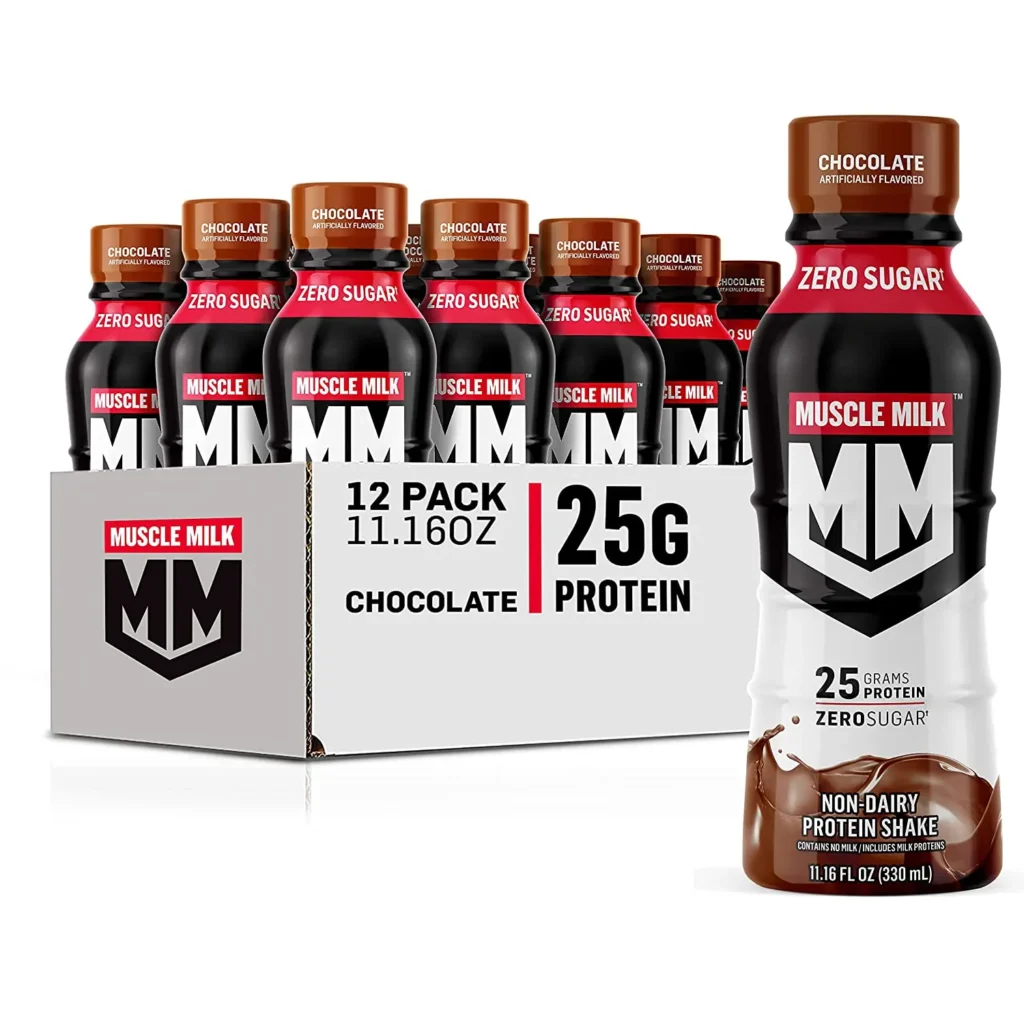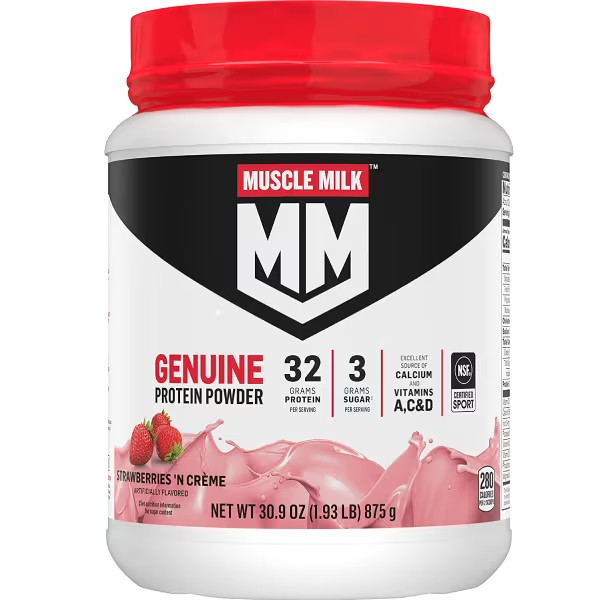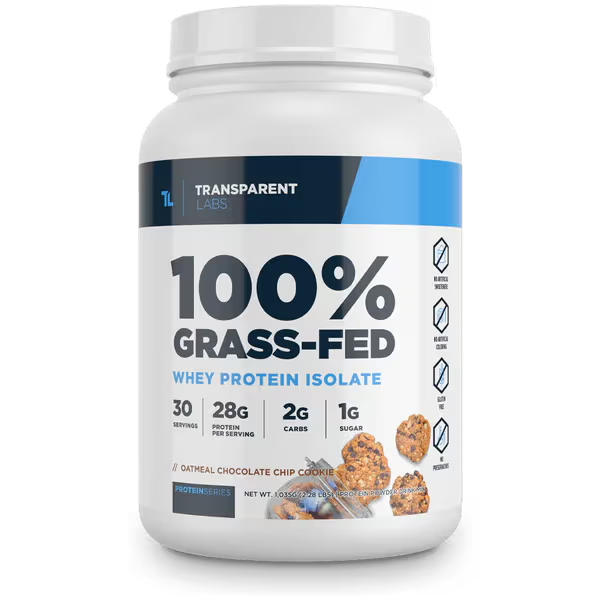Muscle Milk vs Whey Protein – What’s the Difference?
It’s well established that protein is essential in the muscle-building process. With many different protein supplement forms existing, muscle milk vs whey protein is one debate when considering what supplement to buy. I’ve broken down both protein supplements below, compared the differences, and provided you with the choices we recommend.
Muscle Milk vs Whey Protein: Muscle Milk is a group of protein supplements, which contain different types of proteins, including whey and casein in powder or ready-to-drink shakes. Whey protein is a separate fraction of milk protein with a great ratio between price, quantity and quality of protein per serving.
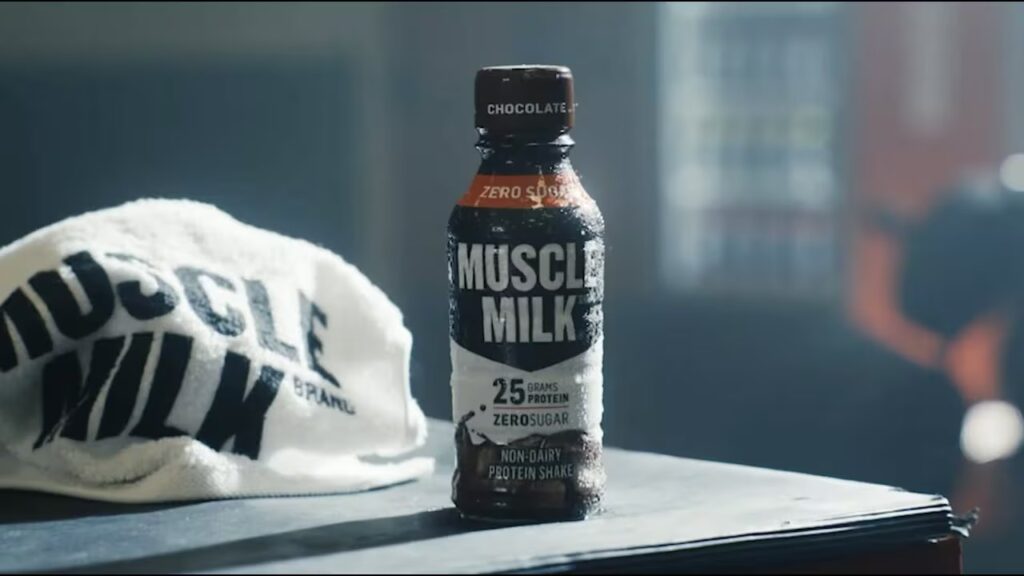
What is Muscle Milk?
Muscle Milk is a popular protein supplement made up of several types of protein including milk protein concentrate, milk protein isolate, whey concentrate, whey isolate, whey hydrolysate, and casein. Depending on the product series, Muscle Milk protein supplements may contain different types and blends of protein.
What is Whey Protein?
Whey Protein is a type of protein dietary supplement manufactured by multiple brands. It usually comes as one main protein ingredient or as a blend of different whey proteins, which may include whey concentrate, whey isolate and whey hydrolysate.
Muscle Milk vs Whey Protein
When comparing whey protein vs muscle milk, here are the key differences:
1. Type of Protein
Depending on the product series, Muscle Milk protein supplements in powder form may contain different protein mixtures:
- Whey protein concentrate + whey protein isolate (100% Whey series),
- Micellar casein + hydrolyzed whey protein concentrate (Sleeping Giant series),
- Milk protein isolate + calcium and sodium caseinate + whey protein concentrate (Pro Series),
- Milk protein isolate + whey protein concentrate + calcium and sodium caseinate (Genuine Series).
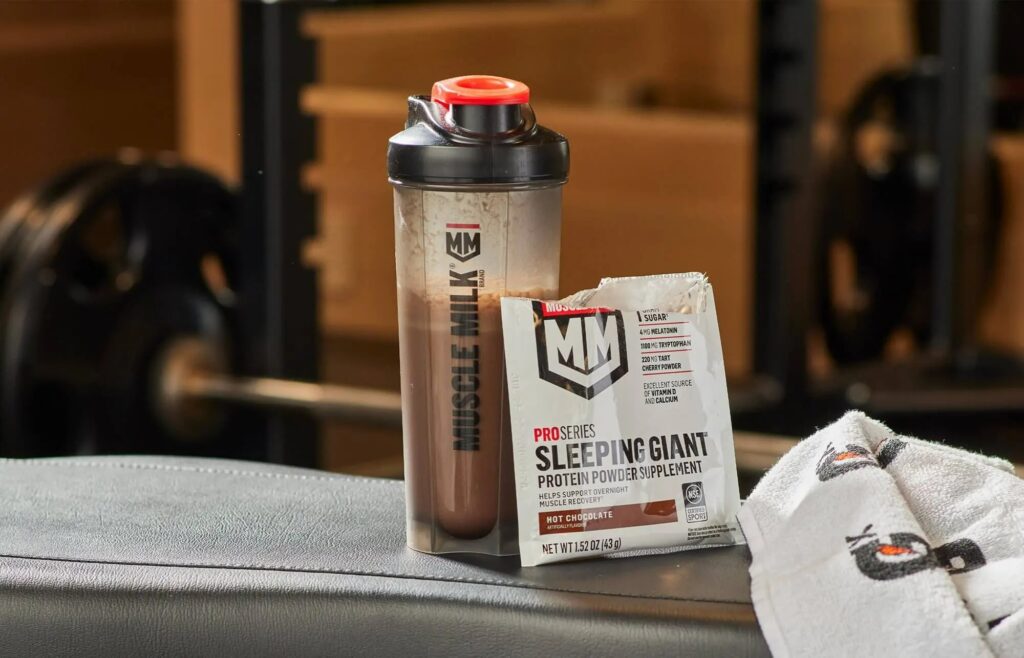
As for ready-to-drink protein shakes, Muscle Milk products use milk protein concentrate or isolate, as well as calcium caseinate and/or sodium caseinate.
Muscle milk products, in which the key ingredient is milk protein isolate or milk protein concentrate, contain a mixture of 2 protein fractions that are naturally found in milk – casein and whey protein. These proteins have different digestion rates.
Whey protein is a fast-digesting and quickly absorbing protein. Casein is a slow-digesting protein that takes much longer to digest, making it ideal for consuming before periods of fasting, such as before going to bed.
In general, milk protein concentrate or isolate is an excellent source of high-quality protein that combines the properties of both protein fractions. To quote from NSCA’s Guide to Sport and Exercise Nutrition: “Whey and casein can have profoundly different biochemical effects that athletes can take advantage of.”
Whey protein is a separate fraction of milk protein that was separated from casein during the cheese production process. The most common forms of whey protein are whey concentrate and whey isolate.
Whey concentrate contains 70-80% protein from the dry weight of the supplement in the form of powder, as well as a significant or small portion of fat and carbohydrates. Whey isolate goes through additional filtration processes and contains a higher percentage of protein (up to 90% or higher) and usually zero or very little fat and lactose. If the isolate has been further processed, it becomes a hydrolyzate.
2. Average Macronutrients Content
Most whey proteins contain 24-25 grams of protein per serving. In terms of protein-to-weight ratio, the percentage of protein in such products is approximately 75-90%. The amount of carbohydrates per serving is from 0 to 4 g, fats are from 0 to 2 g. The calorie content of one serving is 120 kcal on average.
As for protein powders from Muscle Milk, depending on the series, a serving may contain from 25 g to 50 g of protein, 1-9 g of fat, and 5-21 of carbohydrates. The calorie content is from 130 kcal to 320 kcal per serving. Muscle Milk products contain approximately 45-75% protein content by weight.
Some Muscle Milk products also contain a significant serving of fiber and a big serving of vitamins and minerals.
3. Price Range
As Muscle Milk comes in a variety of products, and whey protein as a whole group comes from different brands, the prices vary.
In general, one serving of whey protein costs $1.2-2 (isolate is more expensive). As for Muscle Milk products, a serving costs more on average, especially when considering ready-to-drink shakes.

Muscle Milk vs Whey Protein: Summary
When comparing muscle milk or whey protein, both provide great protein supplement choices. The correct use of each depends on your individual goals, time of day, taste preference, gastrointestinal tolerance and budget.
1. Pros and Cons of Muscle Milk
So is muscle milk good protein powder? Let’s look at the pros and cons:
Pros
✅ There is a choice of different products with milk protein as main ingredient (which mean fast- and slow-absorbing proteins in one product)
✅ Сomes in a variety of forms including ready-to-drink shakes and protein powder
✅ Some Muscle Milk products contains a good variety of added vitamins and minerals, including large amount of calcium per serving
✅ The products of Muscle Milk are usually third party tested (NSF International)
Cons
❌ Generally has a lower protein-by-weight ratio than regular whey powder
❌ Some products contain a large amount of carbohydrates and fats, and accordingly, a higher caloric content
❌ In terms of protein per serving, Muscle Milk products may be more expensive than regular whey protein powder
2. Pros and Cons of Whey Protein
Pros
✅ Better protein-by-weight ratio per serving (higher percentage of protein)
✅ Whey protein powders contains zero-to few grams of carbs and fats
✅ The optimal ratio between price, quantity and quality of protein per serving
Cons
❌ In terms of digestibility rate and additional bioactive components has the benefits of only whey protein
❌ Contains much less calcium per serving than some Muscle Milk products
Muscle Milk vs Whey Protein – When to Use Each?
So, is muscle milk better than whey protein? When should you use each?
Both provide convenient sources of high-quality protein that are easily accessible, with the composition and nutrient profiles changing their suitable uses.
Muscle milk can be used as a pre-workout and post-workout supplement, as well as meal replacement, if the particular product contains a significant portion of fiber and a mixture of vitamins and minerals. Whey protein is better used as a pre-workout and post-workout supplement, but not as a meal replacement.
Muscle Milk We Recommend
The Muscle Milk Genuine Protein Shake comes in a handy 12-bottle package, with each shake containing 25 grams of protein, 5 grams of fiber, zero added sugar, Vitamins A, C, D, plus large amounts of calcium and potassium. It is one of the best ready-to-drink shakes on the market, which contains a mixture of whey protein and casein. They taste great when added to oatmeal, pancakes, coffee, smoothies, or on their own.
Powder Muscle Milk We Recommend
Another great choice is the Muscle Milk Genuine Protein Powder. Each serving contains 32 grams of protein and only 1 gram of added sugar. This protein contains a mix of milk protein isolate and whey protein concentrate, making it a balanced source of both fast- and slow-absorbing proteins.
It also contains a whopping 590 mg of calcium per serving, as well as a mix of other micronutrients, including magnesium, potassium and vitamin D. It’s easy to mix with water or milk.
This protein has third-party certification for banned substances by NSF. This is a great option for those who are gaining muscle mass.
Whey Protein We Recommend
I recommend Transparent Labs Grass-Fed Whey Protein Isolate and there are many reasons for this: it contains only 100% protein isolate (not a mix of concentrate and isolate), a whooping 28 grams of protein per serving and zero grams of fat. This product has versatile macro breakdown and this is why it’s suitable for any goal. Another addition
FAQs
Is Muscle Milk Better Than Whey Protein?
It’s a great source of high-quality protein, but generally Muscle Milk has a lower protein-by-weight ratio due to the higher weight of the portion and higher amount of carbohydrates and fats (although it depends on specific product series). On the other hand, Muscle Milk may taste better on its own or added to different foods.
Is Muscle Milk Protein Powder Good?
Yes, this protein powder has a great mix of ingredients and high-quality protein, with plenty of BCAAs per serving. If you’re looking to up your protein intake for the day, this is a great option.
What Type of Protein Is in Muscle Milk?
Depending on the specific series of the product, it may contain whey proteins or a mix of whey protein and casein. No matter what you choose, you’ll be getting the highest quality protein in any case.
Summary – Muscle Milk vs Whey Protein
Muscle Milk provides a great protein or high protein meal replacement options, and tastes great with different foods, although it generally has a lower protein-by-weight ratio, than regular whey protein powders. Whey protein is an excellent muscle milk alternative that contains high-quality protein with fewer calories per serving, and has a better overall ratio between price, quantity and quality of protein per serving.
Have you tried muscle milk before? What about whey protein? Do you agree with the points I’ve raised above? Let me know in the comments.
Also read:
- Premier Protein vs Muscle Milk
- Does Protein Powder Have Caffeine
- Best Optimum Nutrition Flavor
- Best Tasting Protein Powder With Water
- Best Myprotein Flavour
- Best Protein Powder To Lower Cholesterol
- Best Low Sodium Protein Powder
- Best Protein Powder For People Over 50
- Vegan vs Whey Protein
References:
- Dietary Protein and Muscle Mass: Translating Science to Application and Health Benefit // Ncbi: https://www.ncbi.nlm.nih.gov/pmc/articles/PMC6566799/
- Milk Protein Concentrate // Sciencedirect: https://www.sciencedirect.com/topics/agricultural-and-biological-sciences/milk-protein-concentrate
- Casein // Examine: https://examine.com/supplements/casein-protein/
- Best Muscle Milk Products For Muscle Gain, Pre-Workout, And More // Barbend: https://barbend.com/best-muscle-milk/
- Are you getting too much protein? // Mayo clinic health system: https://www.mayoclinichealthsystem.org/hometown-health/speaking-of-health/are-you-getting-too-much-protein
Why Trust Us?
With over 20 years in Olympic Weightlifting, our team does its best to provide the audience with ultimate support and meet the needs and requirements of advanced athletes and professional lifters, as well as people who strive to open new opportunities and develop their physical capabilities with us.
By trusting the recommendations of our certified experts in coaching, nutrition, dietology, and sports training programming, as well as scientific consultants, and physiotherapists, we provide you with thorough, well-considered, and scientifically proven content. All the information given in the articles concerning workout programming, separate exercises, and athletic performance, in general, is based on verified data. We ensure that you can rely on our professionals’ pieces of advice and recommendations that can be treated as personalized ones which will benefit you and fully meet your needs.
The product testing process is described in more detail here
Author: Oleksandr Maksymenko
Certified Sports Nutritionist,
MSc Sports Dietetics
Specializing in: Weight management, Fitness / Sports nutrition
Oleksandr is a professional fitness nutritionist certified by the Fitness Professional Association (FPA). He follows the principles of evidence-based dietetics and fosters a healthy relationship with food in his clients, ensuring there are no strict prohibitions on their favorite foods or frequent lapses. His primary goal is not only to achieve results for you but also to sustain them over the long term, all while enjoying tasty and delicious food.

